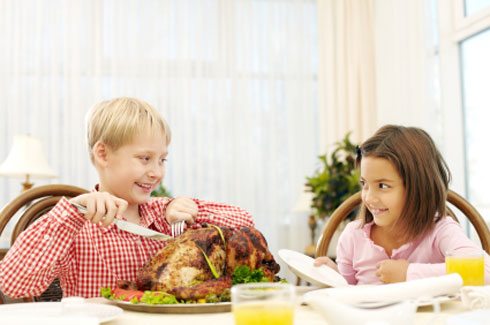Holiday Dinner Table Manners
Tags: etiquette / manners, family, meal times, techniques
Yes, its that time of year when we gather around the table and enjoy holiday dinner with our extended family. Joy right? Ahh, not so much, especially if you are stressed about your uncouth 7 year old son behaviour. Will he break bread or break wind, or worse, toss bread? Or pout about hating his gravy touching his peas.
Shouting “Where are your manners?” is just as much a part of the feastive meal as cranberry sauce.
We forget our children have substandard table manners until their under scrutiny of company and extended family. Suddenly we think that a stern look or a quiet reminder is somehow going to snap them into shape like yet another Christmas miracle.
Instead we have to invest some time BEFORE the holidays to prepare and train our children in the ways we expect them to behave when we have company. Here is my quickie table manners course:
Alyson’s Table Manners Bootcamp:
1) Don’t teach table manners during the special occasions. Instead, have some family dinners together that are “fancy” in the dinner room with china, crystal, and gravy boats on a Sunday night when its just your family. Get dressed up. Make it over the top fun, like you are actors in a play about movies. “Pardon me Geeves, but would you care for some more water with lime in your goblet?”
2) Teach instead of correct. Discuss manners in a relaxed “did you know” way. Usually we just correct children for their mistakes which they hear as criticism. “Your bread plate is the one on the left” is nicer than “ hey – that’s not your plate, use the other one”.
3) Explain that there are different levels of manners based on the formality of the occasion. It may be okay to skip the napkin when you are eating grill cheese for lunch, but Christmas dinner means you need to put the clothe napkin on your lap. Discuss this BEFORE company arrives. If you don’t your children will think you are inconsistent and are just making up different rules all the time.
4) Create a list of misbehaviours (privately) that you specifically want to parent around and tackle them NOW: 3 common ones and their solutions are here:
1. Interrupting while others are speaking (try passing around the salt shaker and who ever has the salt shaker has the floor and can speak while others listen. You may also need to bring a timer from a board game to the table to make sure no-one fillabusts longer then 3 minutes).
2. Getting up and down from the table: Try applying a logical consequence “ If you get up from the table, that tells me you are done the meal” If you child opts to get down, so be it. Quietly and calmly remove their plate, and don’t offer alternative food until the next meal time. They’ll soon learn to stay at the table and eat enough to fill their tummy.
3. Disturbing by bubbling milk and other hijinks. Most dinner disturbance serve to keep the lime light on the child. Instead of responding to misbehaviors with nagging and reminding – ignore poor manners and instead use distraction to engage the child in a more positive conversation. Ask them about their favorite super hero, or what they want to be when they grow up.
If your children don’t use their manners, you can excuse them from the table and invite them to come back when they do want to use their manners. OR, you can excuse yourself and choose to eat in the kitchen where you don’t have to watch poor table manners.
Try some of these in the weeks to come BEFORE the big holiday feast with family. And when in doubt – you can always have the kids and cousins eat on a card table in basement!




7 Responses to “Holiday Dinner Table Manners”
Kate Jamieson
Great article. I really like the idea of teaching good table manners ahead of the actual event instead of correcting at the table.
Alyson Schafer
Thanks for the comment. Hopefully parents will enjoy some fun fancier dinners too!
Wayne Peters
The oldest boy in our family finished dinner and sat himself in the living room beside our open dinning room. There was two of us still eating at the table; myself and the youngest boy. The youngest boy was talking about science that he was learning. The eldest boy cut off the youngest boys conversation and put down what he was saying. I intervened and told the eldest boy that he left the table and shouldn’t disturb anyone still eating.
I was just wondering if I was out of line by doing this?
Thanks in advance
Alyson Schafer
Hi Wayne,
I would encourage him to enjoy the benefits of being at the table, which is to participate in the conversations. It sounds like he has an opinion on the matter – could he please come join the talk at the table and try say what he was wanting to say without the put down. Hope that helps. If one child both LEAVES the table AND throws INSULTS, he is the more discouraged of two and needs the most encouragement to feel a sense of belonging in the family. Move in ways that try to integrate and involve him the family so he doesn’t need to put others down in order to elevate himself. Hope that helps. Alyson
Vanessa
Hi Alyson,
I have picky eaters (6 + 9 yrs). They eat well at home because I know what foods to serve. I would like to know what to do when going to a restaurant of another person’s house. The older generation (great uncle and one grandparent) both think my kids have bad manners because I haven’t taught them to to appear gracious they don’t eat well when away from home. What steps do I take? What are your thoughts on this subject?
Thanks, Vanessa
Alyson Schafer
Hi Vanessa.
One of the draw backs of being a picky eater is that not every one will cater to your tastes. When you kids eat out at other people’s places or restaurants, they will be faced with a challenge. Being polite is how to use etiquette. Teach your children to politely accept the meal served rather than moaning ” oh – I don’t like that”. Teach your child how to move items around the plate so it looks like they did try things – even if they didn’t put them in their mouth. Teach them to say they are satisfied, even if they didn’t partake in the food. They will have to learn to hold their appetites until they are home to their preferred food. Imagine you are training them to be 25 year old business people who have to accept business lunches / dinners and don’t want to appear rude or juvenile. That’s precisely what you teach them at 6 and 9! Life preparation. Hopefully they will outgrow their narrow palate, but some don’t.
Susan
Thanks Allison, good article! We think if you eat dinner together as a family at the table on a regular basis (we try to every night) and have consistent manner expectations, it makes special occasions much easier! From newborn age, my daughter sat with us (in her high chair, etc). She is expected to keep elbows off the table, use her napkin, try at least a bite of every item (if she doesn’t like it, we don’t fight), say thank you for dinner, and ask to be excused. By the age of 5 she had to clear her plate. Now at 9 she sets and clears the whole table. My friends are astounded when she Thanks them for dinner and clears her own dishes. She doesn’t mind at all…it’s just normal!